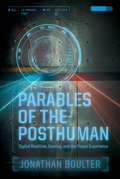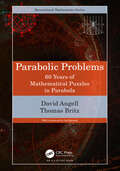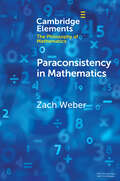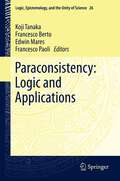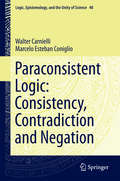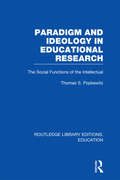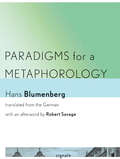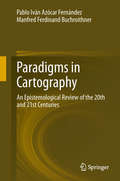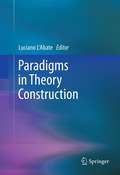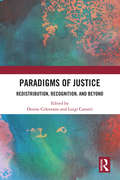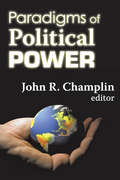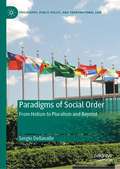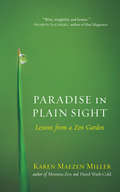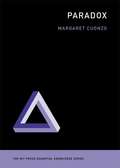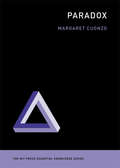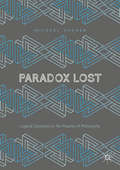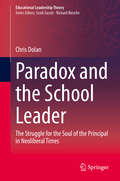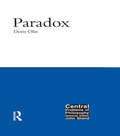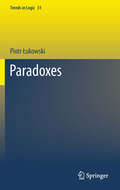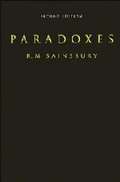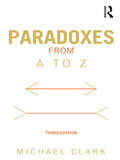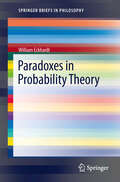- Table View
- List View
Parables of the Posthuman: Digital Realities, Gaming, and the Player Experience (Contemporary Approaches to Film and Media Series)
by Jonathan BoulterIn its intimate joining of self and machine, video gaming works to extend the body into a fluid, dynamic, unstable, and discontinuous entity. While digital gaming and culture has become a popular field of academic study, there has been a lack of sustained philosophical analysis of this direct gaming experience. In Parables of the Posthuman: Digital Realities, Gaming, and the Player Experience, author Jonathan Boulter addresses this gap by analyzing video games and the player experience philosophically. Finding points of departure in phenomenology and psychoanalysis, Boulter argues that we need to think seriously about what it means to enter into a relationship with the game machine and to assume (or to have conferred upon you) a machinic, posthuman identity. Parables of the Posthuman approaches the experience of gaming by asking: What does it mean for the player to enter the machinic "world" of the game? What forms of subjectivity does the game offer to the player? What happens to consciousness itself when one plays? To this end, Boulter analyzes the experience of particular role-playing video games, including Fallout 3, Half-Life 2, Bioshock, Crysis 2, and Metal Gear Solid 4. These games both thematize the idea of the posthuman--the games are "about" subjects whose physical and intellectual capacities are extended through machine or other prosthetic means--and also enact an experience of the posthuman for the player, who becomes more than what he was as he plays the game. Boulter concludes by exploring how the game acts as a parable of what the human, or posthuman, may look like in times to come. Academics with an interest in the intersection of philosophy, psychoanalysis, and popular culture forms and video gamers with an interest in thinking about the implications of gaming will enjoy this volume.
Parabolic Problems: 60 Years of Mathematical Puzzles in Parabola (AK Peters/CRC Recreational Mathematics Series)
by David Angell Thomas BritzParabola is a mathematics magazine published by UNSW, Sydney. Among other things, each issue of Parabola has contained a collection of puzzles/problems, on various mathematical topics and at a suitable level for younger (but mathematically sophisticated) readers.Parabolic Problems: 60 Years of Mathematical Puzzles in Parabola collects the very best of almost 1800 problems and puzzles into a single volume. Many of the problems have been re-mastered, and new illustrations have been added. Topics covered range across geometry, number theory, combinatorics, logic, and algebra. Solutions are provided to all problems, and a chapter has been included detailing some frequently useful problem-solving techniques, making this a fabulous resource for education and, most importantly, fun!Features Hundreds of diverting and mathematically interesting problems and puzzles. Accessible for anyone with a high school-level mathematics education. Wonderful resource for teachers and students of mathematics from high school to undergraduate level, and beyond.
Paraconsistency in Mathematics (Elements in the Philosophy of Mathematics)
by Zach WeberParaconsistent logic makes it possible to study inconsistent theories in a coherent way. From its modern start in the mid-20th century, paraconsistency was intended for use in mathematics, providing a rigorous framework for describing abstract objects and structures where some contradictions are allowed, without collapse into incoherence. Over the past decades, this initiative has evolved into an area of non-classical mathematics known as inconsistent or paraconsistent mathematics. This Element provides a selective introductory survey of this research program, distinguishing between `moderate' and `radical' approaches. The emphasis is on philosophical issues and future challenges.
Paraconsistency: Logic and Applications
by Francesco Berto Edwin Mares Francesco Paoli Koji TanakaA logic is called 'paraconsistent' if it rejects the rule called 'ex contradictione quodlibet', according to which any conclusion follows from inconsistent premises. While logicians have proposed many technically developed paraconsistent logical systems and contemporary philosophers like Graham Priest have advanced the view that some contradictions can be true, and advocated a paraconsistent logic to deal with them, until recent times these systems have been little understood by philosophers. This book presents a comprehensive overview on paraconsistent logical systems to change this situation. The book includes almost every major author currently working in the field. The papers are on the cutting edge of the literature some of which discuss current debates and others present important new ideas. The editors have avoided papers about technical details of paraconsistent logic, but instead concentrated upon works that discuss more "big picture" ideas. Different treatments of paradoxes takes centre stage in many of the papers, but also there are several papers on how to interpret paraconistent logic and some on how it can be applied to philosophy of mathematics, the philosophy of language, and metaphysics.
Paraconsistent Logic: Consistency, Contradiction and Negation
by Walter Carnielli Marcelo Esteban ConiglioThis book is the first in the field of paraconsistency to offer a comprehensive overview of the subject, including connections to other logics and applications in information processing, linguistics, reasoning and argumentation, and philosophy of science. It is recommended reading for anyone interested in the question of reasoning and argumentation in the presence of contradictions, in semantics, in the paradoxes of set theory and in the puzzling properties of negation in logic programming. Paraconsistent logic comprises a major logical theory and offers the broadest possible perspective on the debate of negation in logic and philosophy. It is a powerful tool for reasoning under contradictoriness as it investigates logic systems in which contradictory information does not lead to arbitrary conclusions. Reasoning under contradictions constitutes one of most important and creative achievements in contemporary logic, with deep roots in philosophical questions involving negation and consistency This book offers an invaluable introduction to a topic of central importance in logic and philosophy. It discusses (i) the history of paraconsistent logic; (ii) language, negation, contradiction, consistency and inconsistency; (iii) logics of formal inconsistency (LFIs) and the main paraconsistent propositional systems; (iv) many-valued companions, possible-translations semantics and non-deterministic semantics; (v) paraconsistent modal logics; (vi) first-order paraconsistent logics; (vii) applications to information processing, databases and quantum computation; and (viii) applications to deontic paradoxes, connections to Eastern thought and to dialogical reasoning.
Paradigm and Ideology in Educational Research: The Social Functions of the Intellectual (Routledge Library Editions: Education)
by Thomas S PopkewitzThis book explores the complex social assumptions and values that underlie research programmes about schools. The analysis of educational research draws upon American and European scholarships in the sociology of knowledge, social philosophy and the history and sociology of science. The discussion considers first the communal, crafts and social characteristics of educational research. Three research models empirical-analytic, symbolic or linguistic and critical sciences are given attention. The discussion of the three research models is to illuminate how the constellation of commitments, assumptions and practices inter-relate to perform a paradigm giving different and conflicting definitions to the meaning of educational theory and to the use of the particular techniques of enquiry. The social role of educational research and the researcher is also considered.
Paradigms for a Metaphorology
by Robert Savage Hans Blumenberg"Paradigms for a Metaphorology may be read as a kind of beginner's guide to Blumenberg, a programmatic introduction to his vast and multifaceted oeuvre. Its brevity makes it an ideal point of entry for readers daunted by the sheer bulk of Blumenberg's later writings, or distracted by their profusion of historical detail. Paradigms expresses many of Blumenberg's key ideas with a directness, concision, and clarity he would rarely match elsewhere. What is more, because it served as a beginner's guide for its author as well, allowing him to undertake an initial survey of problems that would preoccupy him for the remainder of his life, it has the additional advantage that it can offer us a glimpse into what might be called the ‛genesis of the Blumenbergian world.’"-from the Afterword by Robert SavageWhat role do metaphors play in philosophical language? Are they impediments to clear thinking and clear expression, rhetorical flourishes that may well help to make philosophy more accessible to a lay audience, but that ought ideally to be eradicated in the interests of terminological exactness? Or can the images used by philosophers tell us more about the hopes and cares, attitudes and indifferences that regulate an epoch than their carefully elaborated systems of thought?In Paradigms for a Metaphorology, originally published in 1960 and here made available for the first time in English translation, Hans Blumenberg (1920-1996) approaches these questions by examining the relationship between metaphors and concepts. Blumenberg argues for the existence of "absolute metaphors" that cannot be translated back into conceptual language. These metaphors answer the supposedly naïve, theoretically unanswerable questions whose relevance lies quite simply in the fact that they cannot be brushed aside, since we do not pose them ourselves but find them already posed in the ground of our existence. They leap into a void that concepts are unable to fill.An afterword by the translator, Robert Savage, positions the book in the intellectual context of its time and explains its continuing importance for work in the history of ideas.
Paradigms in Cartography
by Pablo Iván Azócar Fernández Manfred Ferdinand BuchroithnerIn this book the main trends, concepts and directions in cartography and mapping in modernism and post-modernism are reviewed. Philosophical and epistemological issues are analysed in cartography from positivist-empiricist, neo-positivist and post-structuralist stances. In general, in cartography technological aspects have been considered as well as theoretical issues. The aim is to highlight the epistemological and philosophical viewpoint during the development of the discipline. Some main philosophers who have been influential for contemporary thinking such as Immanuel Kant, Ludwig Wittgenstein, Karl Popper and Bertrand Russell, are considered. None of these philosophers wrote about cartography directly (excepting Kant), but their philosophies are related to cartography and mapping issues. The book also analyses the concept of paradigm or paradigm shift coined by Thomas Kuhn, who applied it to the history of science. Different cartographic trends that have arisen since the second half of the twentieth century are analysed according to this important concept which is implicit inside the scientific or disciplinary communities. Further, the authors analyse the position of cartography in the context of the sciences and other disciplines, adopting a positivistic point of view. Additionally, they review current trends in cartography and mapping in the context of information and communication technologies in a post-modernistic or post-structuralistic framework. Thus, since the 1980s and 1990s, new mapping concepts have arisen which challenge the discipline's traditional map conceptions.
Paradigms in Theory Construction
by Luciano L'AbateWithin the field of psychology there is a proliferation of paradigms, theories, models, and dimensions without an underlying conceptual framework or theory. This conclusion has been reached by representatives of many different psychological specialties. In response to this inconsistency this book presents a hierarchical framework about important theoretical issues that are present in psychological thinking. These issues concern definitions of three major theoretical concepts in theory and practice: (a) paradigms, (b) theories, and (c) models. It focuses on defining, comparing, and contrasting these three conceptual terms. This framework clarifies differences among paradigms, theories, and models, terms which have become increasingly confused in the psychological literature. Paradigms are usually confused with theories or with models while theories are confused with models. Examples of misuses of these terms suggest the need for a hierarchical structure that views paradigms as conceptual constructions overseeing a variety of psychological theories and verifiable models.
Paradigms of Justice: Redistribution, Recognition, and Beyond
by Denise Celentano; Luigi CarantiThis book explores the relation between redistribution and recognition, two key paradigms in the contemporary discourse on justice. Combining insights from the traditions of critical social theory and analytical political philosophy, the volume offers a multifaceted exploration of this incredibly inspiring conceptual couple from a plurality of perspectives. The chapters engage with concepts such as universal basic income, property-owning democracy, poverty, equality, self-respect, pluralism, care, and work, all of which have an impact on individuals’ recognition as well as on distributive policies. An important contribution to the field of political and social philosophy, the volume will be useful to scholars and researchers of politics, law, human rights, economics, social justice, as well as policymakers.
Paradigms of Political Power
by John R. ChamplinGenerations of men have used the notion of "power" to make sense of their political experience. Despite the fact that the term has recently fallen into comparative disfavor, the scholarly debate over the nature of power continues, with experts still striving to obtain an exact understanding of what power really is. The works collected by John R. Champlin here clearly set forth all the important arguments in the lively dispute, with a focus on the essential question: can the concept of power be used to unify the study of politics?The contributors to this work search for a definition of power, assess the value of serious political analysis in terms of power, and illustrate applications of the "power concept" to issues locally, nationally, and internationally. Hans Morgenthau supports a power-based political theory; he is countered by Charles A. McClelland and James G. March. Seeking a coherent, useful definition of the term, Thomas Hobbes investigates power in terms of its cause, and Dorothy Emmet draws up a list of distinct uses of power. Theodore Lowi achieves a fresh start on power studies by distinguishing "arenas" of power according to expectations of costs and benefits. The Lowi contribution bears on the debate over how the United States is to be characterized. Opposing C. Wright Mills' theory of the power elite as well as the idea of pluralism, Peter Bachrach and Morton S. Baratz find that opportunities for participation in political decisions and power are very unequally distributed.This unique debate on the definition of power, engaging all sides in direct dialogue with one another, includes the work of important leading scholars in this area of thought. Together with an excellent introduction by the editor, the debate gives an active dimension to this book that will enliven all college classes and interested audiences.
Paradigms of Social Order: From Holism to Pluralism and Beyond (Philosophy, Public Policy, and Transnational Law)
by Sergio DellavalleNo social life is possible without order. Order being the most constituent element of society, it is not surprising that so many theories have been developed to explain what social order is and how it is possible, as well as to explore the features that social order acquires in its different dimensions. The book leads these many theories of social order back to a few main matrices for the use of theoretical and practical reason, which are defined as 'paradigms of order'. The plurality of conceptual constructs regarding social order is therefore reduced to a manageable number of theoretical patterns and an intellectual map is produced in which the most significant differences between paradigms are clearly outlined. Furthermore, the 'paradigmatic revolutions' are addressed that marked the most relevant turning points in the way in which a 'well-ordered society' should be understood. Against this background, the question is discussed on the theoretical and practical perspectives for a cosmopolitan society as the only suitable possibility to meet the global challenges with which we are all presently confronted.
Paradise in Plain Sight
by Karen Maezen MillerCome See the Garden That Is Your Life When Zen teacher Karen Maezen Miller and her family land in a house with a hundred-year-old Japanese garden, she uses the paradise in her backyard to glean the living wisdom of our natural world. Through her eyes, rocks convey faith, ponds preach stillness, flowers give love, and leaves express the effortless ease of letting go. The book welcomes readers into the garden for Zen lessons in fearlessness, forgiveness, presence, acceptance, and contentment. Miller gathers inspiration from the ground beneath her feet to remind us that paradise is always here and now.
Paradox
by Margaret CuonzoThinkers have been fascinated by paradox since long before Aristotle grappled with Zeno's. In this volume in The MIT Press Essential Knowledge series, Margaret Cuonzo explores paradoxes and the strategies used to solve them. She finds that paradoxes are more than mere puzzles but can prompt new ways of thinking. A paradox can be defined as a set of mutually inconsistent claims, each of which seems true. Paradoxes emerge not just in salons and ivory towers but in everyday life. (An Internet search for "paradox" brings forth a picture of an ashtray with a "no smoking" symbol inscribed on it.) Proposing solutions, Cuonzo writes, is a natural response to paradoxes. She invites us to rethink paradoxes by focusing on strategies for solving them, arguing that there is much to be learned from this, regardless of whether any of the more powerful paradoxes is even capable of solution. Cuonzo offers a catalog of paradox-solving strategies -- including the Preemptive-Strike (questioning the paradox itself), the Odd-Guy-Out (calling one of the assumptions into question), and the You-Can't-Get-There-from-Here (denying the validity of the reasoning). She argues that certain types of solutions work better in some contexts than others, and that as paradoxicality increases, the success of certain strategies grows more unlikely. Cuonzo shows that the processes of paradox generation and solution proposal are interesting and important ones. Discovering a paradox leads to advances in knowledge: new science often stems from attempts to solve paradoxes, and the concepts used in the new sciences lead to new paradoxes. As Niels Bohr wrote, "How wonderful that we have met with a paradox. Now we have some hope of making progress."
Paradox (The MIT Press Essential Knowledge Series)
by Margaret CuonzoAn introduction to paradoxes showing that they are more than mere puzzles but can prompt new ways of thinking. Thinkers have been fascinated by paradox since long before Aristotle grappled with Zeno's. In this volume in The MIT Press Essential Knowledge series, Margaret Cuonzo explores paradoxes and the strategies used to solve them. She finds that paradoxes are more than mere puzzles but can prompt new ways of thinking. A paradox can be defined as a set of mutually inconsistent claims, each of which seems true. Paradoxes emerge not just in salons and ivory towers but in everyday life. (An Internet search for “paradox” brings forth a picture of an ashtray with a “no smoking” symbol inscribed on it.) Proposing solutions, Cuonzo writes, is a natural response to paradoxes. She invites us to rethink paradoxes by focusing on strategies for solving them, arguing that there is much to be learned from this, regardless of whether any of the more powerful paradoxes is even capable of solution. Cuonzo offers a catalog of paradox-solving strategies—including the Preemptive-Strike (questioning the paradox itself), the Odd-Guy-Out (calling one of the assumptions into question), and the You-Can't-Get-There-from-Here (denying the validity of the reasoning). She argues that certain types of solutions work better in some contexts than others, and that as paradoxicality increases, the success of certain strategies grows more unlikely. Cuonzo shows that the processes of paradox generation and solution proposal are interesting and important ones. Discovering a paradox leads to advances in knowledge: new science often stems from attempts to solve paradoxes, and the concepts used in the new sciences lead to new paradoxes. As Niels Bohr wrote, “How wonderful that we have met with a paradox. Now we have some hope of making progress.”
Paradox Lost: Logical Solutions to Ten Puzzles of Philosophy
by Michael HuemerParadox Lost covers ten of philosophy’s most fascinating paradoxes, in which seemingly compelling reasoning leads to absurd conclusions. The following paradoxes are included: The Liar Paradox, in which a sentence says of itself that it is false. Is the sentence true or false?The Sorites Paradox, in which we imagine removing grains of sand one at a time from a heap of sand. Is there a particular grain whose removal converts the heap to a non-heap?The Puzzle of the Self-Torturer, in which a series of seemingly rational choices has us accepting a life of excruciating pain, in exchange for millions of dollars.Newcomb’s Problem, in which we seemingly maximize our expected profit by taking an unknown sum of money, rather than taking the same sum plus $1000.The Surprise Quiz Paradox, in which a professor finds that it is impossible to give a surprise quiz on any particular day of the week . . . but also that if this is so, then a surprise quiz can be given on any day.The Two Envelope Paradox, in which we are asked to choose between two indistinguishable envelopes, and it is seemingly shown that each envelope is preferable to the other.The Ravens Paradox, in which observing a purple shoe provides evidence that all ravens are black.The Shooting Room Paradox, in which a deadly game kills 90% of all who play, yet each individual’s survival turns on the flip of a fair coin. Each paradox is clearly described, common mistakes are explored, and a clear, logical solution offered. Paradox Lost will appeal to professional philosophers, students of philosophy, and all who love intellectual puzzles.
Paradox and the School Leader: The Struggle for the Soul of the Principal in Neoliberal Times (Educational Leadership Theory)
by Chris DolanThis book proposes that paradox, as a theoretically rich and historically enduring concept, has significant potential for researchers in the field of critical leadership studies. By enriching its general form and infusing it with added complexity and theoretical influence, it is argued that paradox can be legitimately applied as a lens for examining and as a pedagogy for realising new learning possibilities.The book takes paradoxes as formed out of the constitutive practices of discourse rather than as representations of conflict or complexity. Using fifteen paradoxes derived from theoretical and empirical analysis, it provides insights into the competing forces that contradict simplistic positivist accounts of contemporary school leadership and reveal the presence of a political struggle for the soul of the principal in the neoliberal era. It considers these paradoxes in three categories: (1) principal subjectivity and authority, (2) neoliberal policy and (3) managerial practice. The book advocates critique, counter-conduct and agonistic thought and practice as resources for principals participating in such a struggle, and employs Foucault's 'care of the self' and 'practices of freedom' to promote more active involvement of principals in authoring their ethical and political selves.
Paradox in Christian Theology: An Analysis of Its Presence, Character, and Epistemic Status
by James AndersonHow can Jesus be fully human and fully divine? How can God be Three-in-One? James Anderson develops and defends a model of understanding paradoxical Christian doctrines according to which the presence of such doctrines is unsurprising and adherence to paradoxical doctrines can be entirely reasonable. As such, the phenomenon of theological paradox cannot be considered as a serious intellectual obstacle to belief in Christianity. The case presented in this book has significant implications for the practice of systematic theology, biblical exegesis, Christian apologetics and philosophy.
Paradox: Paradox (Central Problems Of Philosophy Ser. #12)
by Doris OlinParadoxes are more than just intellectual puzzles - they raise substantive philosophical issues and offer the promise of increased philosophical knowledge. In this introduction to paradox and paradoxes, Doris Olin shows how seductive paradoxes can be, why they confuse and confound, and why they continue to fascinate. Olin examines the nature of paradox, outlining a rigorous definition and providing a clear and incisive statement of what does and does not count as a resolution of a paradox. The view that a statement can be both true and false, that contradictions can be true, is seen to provide a challenge to the account of paradox resolution, and is explored. With this framework in place, the book then turns to an in-depth treatment of the Prediction Paradox, versions of the Preface/Fallibility Paradox, the Lottery Paradox, Newcomb's Problem, the Prisoner's Dilemma and the Sorites Paradox. Each of these paradoxes is shown to have considerable philosophical punch. Olin unpacks the central arguments in a clear and systematic fashion, offers original analyses and solutions, and exposes further unsettling implications for some of our most deep-seated principles and convictions.
Paradoxes
by Marek Gensler Piotr ŁukowskiThis book, provides a critical approach to all major logical paradoxes: from ancient to contemporary ones. There are four key aims of the book: 1. Providing systematic and historical survey of different approaches - solutions of the most prominent paradoxes discussed in the logical and philosophical literature. 2. Introducing original solutions of major paradoxes like: Liar paradox, Protagoras paradox, an unexpected examination paradox, stone paradox, crocodile, Newcomb paradox. 3. Explaining the far-reaching significance of paradoxes of vagueness and change for philosophy and ontology. 4. Proposing a novel, well justified and, as it seems, natural classification of paradoxes.
Paradoxes (Second Edition)
by R. M. SainsburyA paradox can be defined as an unacceptable conclusion derived by apparently acceptable reasoning from apparently acceptable premises. Unlike party puzzles or brain teasers, many paradoxes are serious in that they raise serious philosophical problems, and are associated with crises of thought and revolutionary advances. To grapple with them is not merely to engage in an intellectual game, but to come to grips with issues of real import. The second, revised edition of this intriguing book expands and updates the text to take account of new work on the subject. It provides a valuable and accessible introduction to a range of paradoxes and their possible solutions, with questions designed to engage the reader with the arguments and full bibliographical references to both classic and current literature on the topic.
Paradoxes Between Truth and Proof (Synthese Library #494)
by Giorgio Venturi Mattia PetroloThis book is a collection of essays that offer original logical and philosophical investigations into the century-long endeavor to understand paradoxes. It bridges the gap between the two most prominent traditions in the analysis of paradoxes: the truth-theoretic and proof-theoretic approaches. The truth-theoretic tradition stems from Alfred Tarski's solution to the semantic paradoxes, while the proof-theoretic tradition dates back to Dag Prawitz's analysis of set-theoretic paradoxes in terms of structural proof theory. Rather than viewing these traditions as competing perspectives, this volume advocates for the idea that a deeper understanding of paradoxes requires insights from both truth-theoretic and proof-theoretic conceptions of language and meaning. Although the collection does not aim to be exhaustive, it seeks to highlight the vast scope of the subject and its deep connections to various fields of inquiry. The essays are organized into four sections: the first focuses on methodology, the second and third examine paradoxes through the conventional lenses of logical investigation—semantics and syntax—, and the fourth presents a selection of paradoxes that extend beyond the interplay between syntax and semantics, exploring other dimensions of human rationality.
Paradoxes and Inconsistent Mathematics
by Zach WeberLogical paradoxes – like the Liar, Russell's, and the Sorites – are notorious. But in Paradoxes and Inconsistent Mathematics, it is argued that they are only the noisiest of many. Contradictions arise in the everyday, from the smallest points to the widest boundaries. In this book, Zach Weber uses “dialetheic paraconsistency” – a formal framework where some contradictions can be true without absurdity – as the basis for developing this idea rigorously, from mathematical foundations up. In doing so, Weber directly addresses a longstanding open question: how much standard mathematics can paraconsistency capture? The guiding focus is on a more basic question, of why there are paradoxes. Details underscore a simple philosophical claim: that paradoxes are found in the ordinary, and that is what makes them so extraordinary.
Paradoxes from A to Z
by Michael ClarkParadoxes from A to Z, Third edition is the essential guide to paradoxes, and takes the reader on a lively tour of puzzles that have taxed thinkers from Zeno to Galileo, and Lewis Carroll to Bertrand Russell. Michael Clark uncovers an array of conundrums, such as Achilles and the Tortoise, Theseus’ Ship, and the Prisoner’s Dilemma, taking in subjects as diverse as knowledge, science, art and politics. Clark discusses each paradox in non-technical terms, considering its significance and looking at likely solutions. This third edition is revised throughout, and adds nine new paradoxes that have important bearings in areas such as law, logic, ethics and probability. Paradoxes from A to Z, Third edition is an ideal starting point for those interested not just in philosophical puzzles and conundrums, but anyone seeking to hone their thinking skills.
Paradoxes in Probability Theory
by William EckhardtParadoxes provide a vehicle for exposing misinterpretations and misapplications of accepted principles. This book discusses seven paradoxes surrounding probability theory. Some remain the focus of controversy; others have allegedly been solved, however the accepted solutions are demonstrably incorrect. Each paradox is shown to rest on one or more fallacies. Instead of the esoteric, idiosyncratic, and untested methods that have been brought to bear on these problems, the book invokes uncontroversial probability principles, acceptable both to frequentists and subjectivists. The philosophical disputation inspired by these paradoxes is shown to be misguided and unnecessary; for instance, startling claims concerning human destiny and the nature of reality are directly related to fallacious reasoning in a betting paradox, and a problem analyzed in philosophy journals is resolved by means of a computer program.
